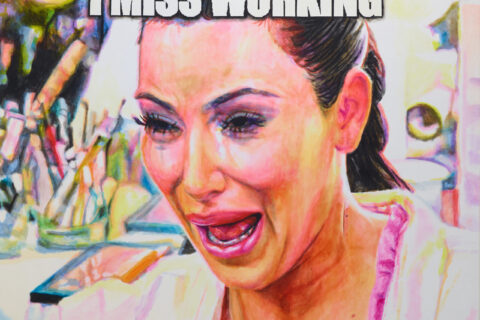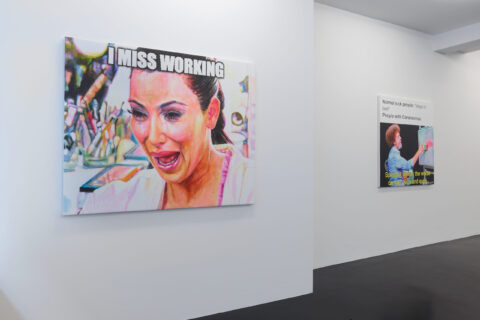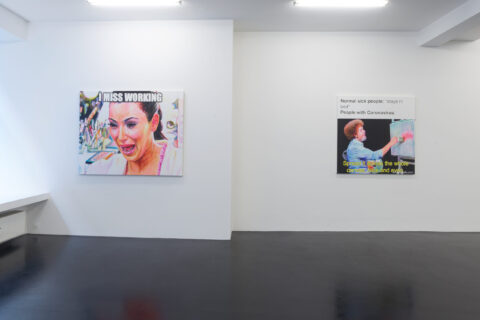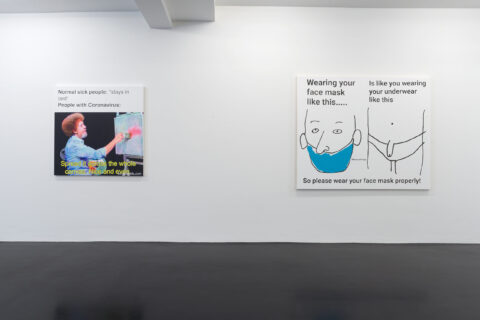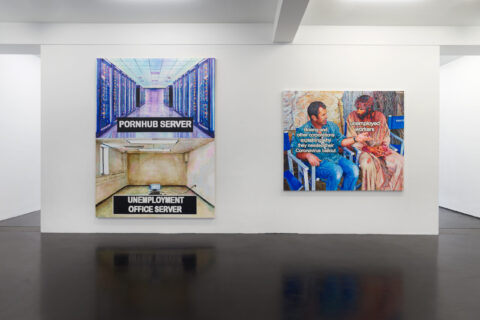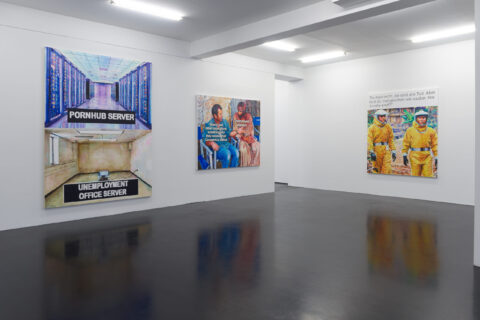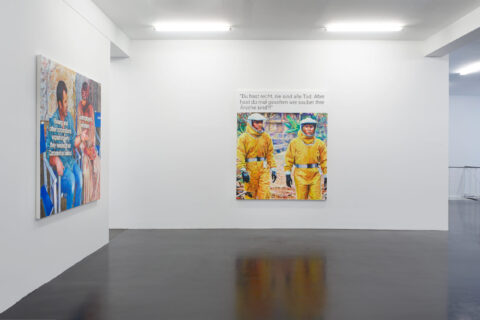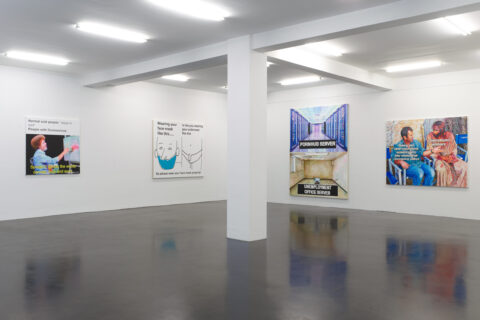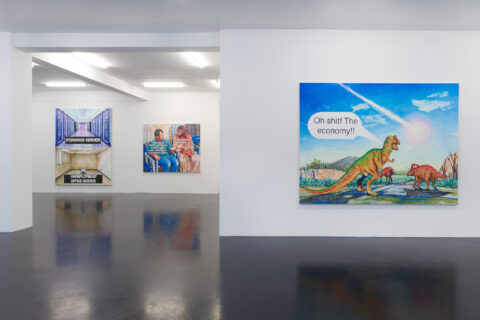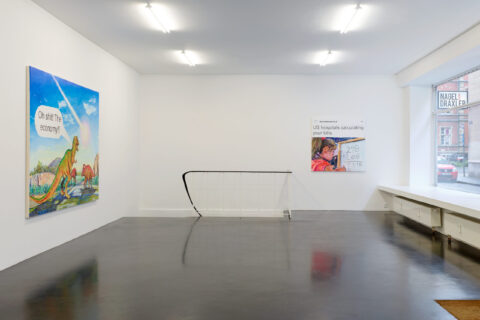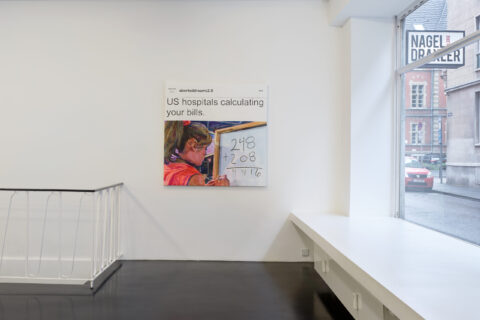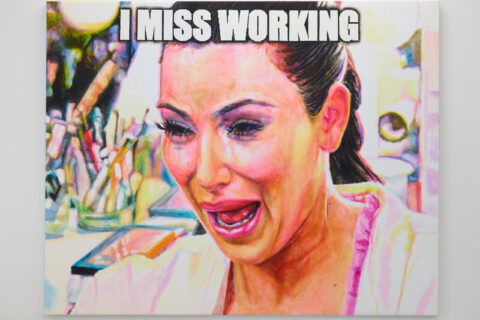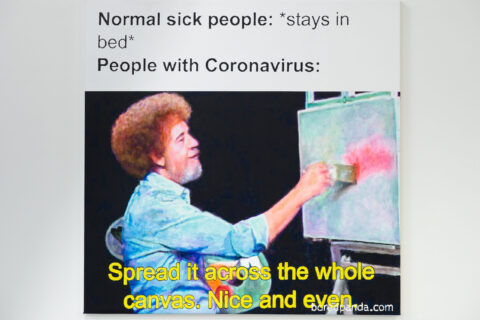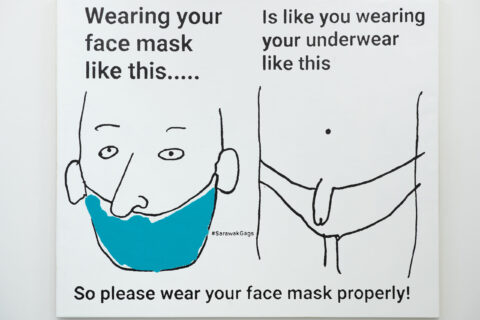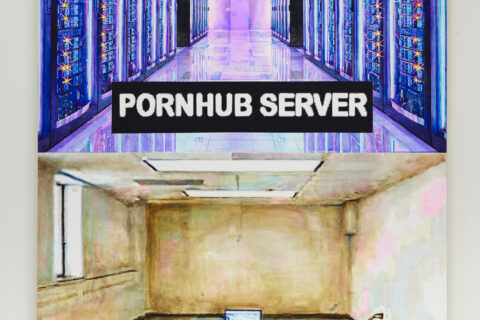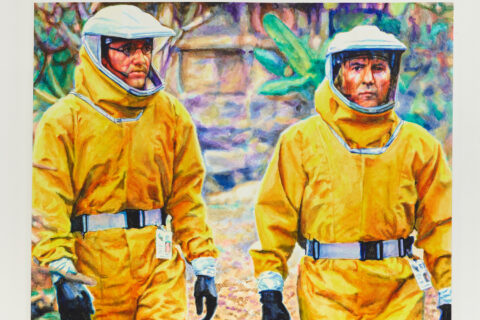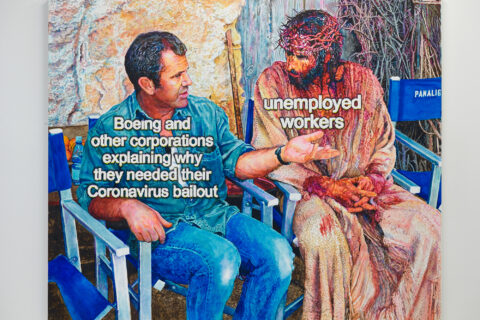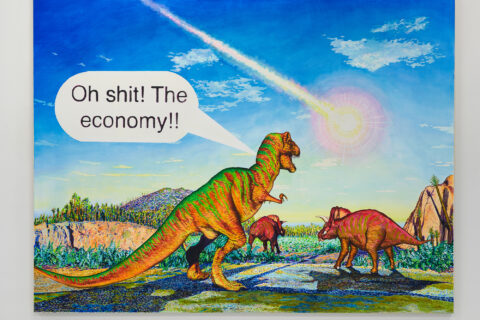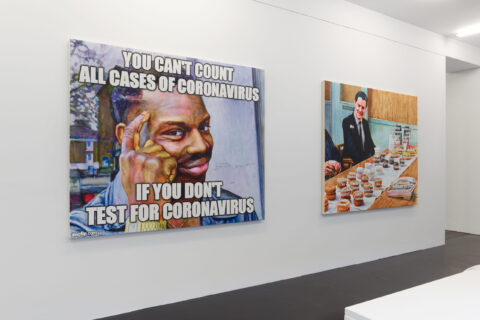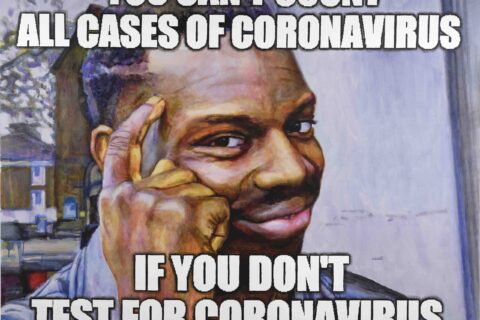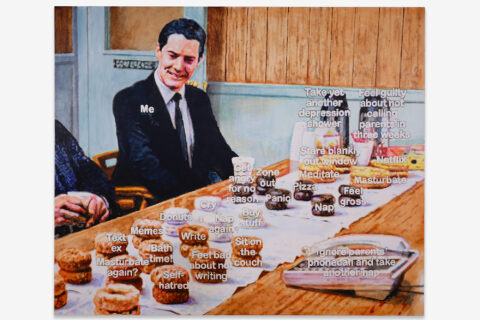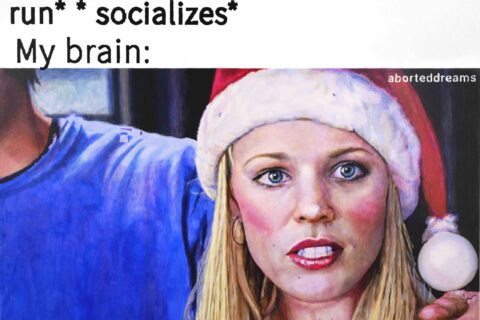Christine Tien Wang Coronavirus Memes
04/09/2020 – 07/11/2020
Galerie Nagel Draxler
Elisenstraße 4–6
50667 Cologne
Eröffnung: Freitag, 4. Sept., 11 – 22 Uhr
Opening: Friday, Sept. 4th, 11am – 10pm
Öffnungszeiten / Hours:
Mittwoch bis Freitag, 11-18 Uhr & Samstag, 11-16 Uhr (ausgenommen sind Feiertage)
Wednesday to Friday, 11am-6pm & Saturday, 11am-4pm (excluding public holidays)
und nach Vereinbarung / and by appointment: koeln@nagel-draxler.de
Verlängerte Öffnungszeiten zur DC Open / DC Open hours
Samstag, 5. Sept.: 11–20 Uhr & Sonntag, 6. Sept.: 11–18Uhr
Saturday, Sept. 5th: 11am–8pm & Sunday, Sept. 6th: 11am–6pm
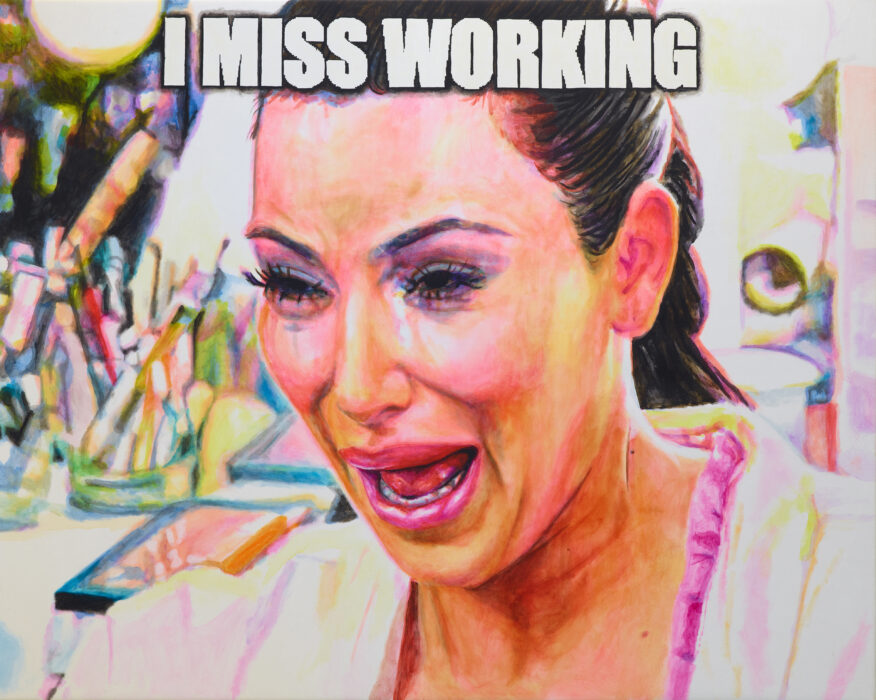
„Coronavirus Memes“, 2020
Installation view
Galerie Nagel Draxler, Cologne
Photo: Simon Vogel
„Coronavirus Memes“, 2020
Installation view
Galerie Nagel Draxler, Cologne
Photo: Simon Vogel
„Coronavirus Memes“, 2020
Installation view
Galerie Nagel Draxler, Cologne
Photo: Simon Vogel
„Coronavirus Memes“, 2020
Installation view
Galerie Nagel Draxler, Cologne
Photo: Simon Vogel
„Coronavirus Memes“, 2020
Installation view
Galerie Nagel Draxler, Cologne
Photo: Simon Vogel
„Coronavirus Memes“, 2020
Installation view
Galerie Nagel Draxler, Cologne
Photo: Simon Vogel
„Coronavirus Memes“, 2020
Installation view
Galerie Nagel Draxler, Cologne
Photo: Simon Vogel
„Coronavirus Memes“, 2020
Installation view
Galerie Nagel Draxler, Cologne
Photo: Simon Vogel
„Coronavirus Memes“, 2020
Installation view
Galerie Nagel Draxler, Cologne
Photo: Simon Vogel
„Hospital Bills“, 2020
Acrylic on canvas
122 x 122 cm
Photo: Simon Vogel
„Kim Kardeshian“, 2020
Acrylic on canvas
152 x 122 cm
Photo: Simon Vogel
„Bob Ross“, 2020
Acrylic on canvas
122 x 122 cm
Photo: Simon Vogel
„Mask Penis“, 2020
Acrylic on canvas
152 x 183 cm
Photo: Simon Vogel
„Pornhub Server“, 2020
Acrylic on canvas
244 x 183 cm
Photo: Simon Vogel
„Yellow Suits Meme“, 2020
Acrylic on canvas
183 x 152 cm
Photo: Simon Vogel
„Mel Gibson Jesus Meme“, 2020
Acrylic on canvas
183 x 152 cm
Photo: Simon Vogel
„Asteroid“, 2020
Acrylic on canvas
239 x 201 cm
Photo: Simon Vogel
„Coronavirus Memes“, 2020
Installation view
Galerie Nagel Draxler, Cologne
Photo: Simon Vogel
„Roll Safe Meme or Digital Blackface in the Age of Racial Violence“, 2020
Acrylic on canvas
152 x 183 cm
Photo: Simon Vogel
“Doughnuts, original meme by @sadpeaks”, 2020
Acrylic on canvas
152 x 183 cm
Photo: Simon Vogel
„Mean Girls“, 2020
Acrylic on canvas
152 x 183 cm
Press Release
Christine Wang's canvases manifest fleeting outbursts of collective creativity. In her works she deals with cyberculture, internet phenomena and digital imagery. Her acrylic colors shimmer like RGB, they transfer pixels back into physical space. For her fifth solo exhibition at Galerie Nagel Draxler, she is copying collected visual material from Instagram: Memes.
The meme (from the Greek mimeme) is itself an imitation, its reproduction is part of the narration. Images are overlaid with texts, in humorous provocation they strive for lulz [1], the merciful malicious joy of the user. Supposedly simplified, these pictorial worlds of Web 2.0 are placed in ever new contexts, appropriating the most up-to-date narratives and developing their own complexity under the speed of a blink of an eye. Away from scrolling, swiping and typing, Christine Wang allows us to take a closer look at this memplex. She generates a snapshot, enlarges it and, through the act of painting, transforms it into a historical moment, a testimony to short-lived reactions. Contrary to the viewing habits that usually accompany memes, the viewers of the „Coronavirus Memes“ stand in front of life-size, sometimes even cinematic motifs and have to relocate their own position. The pictures are dealing with the economic devastation brought on by the pandemic in the US. The complex of themes ranges from mask wearing, unemployment, Coronavirus and current US health policy.
Whether a reality TV star ("Kim Kardashian", 2020), a television painter ("Bob Ross", 2020) or a comic figure ("Goofy Movie", 2020), the protagonists in the picture macros [2] once posed for other narratives. It is common for such a picture to be recontextualized, but within it to convey the same feelings and intentions. Thus, the actor Kayode Ewumi a.k.a. Roll Safe from the web series "Hood Documentary" discovers a dangerous logic: "You can't count all cases of coronavirus / if you don't test for coronavirus". Here, as in the numerous other digital versions, the failure of a critical thought is mocked. With "Roll Safe or Digital Blackface in the Age of Racial Violence" (2020) the artist draws attention to a problem that is a not to be neglected consequence of the poor decision-making of white suprematists, especially in the USA, but also in Germany. Violence against BIPoC [3] and socially disadvantaged people manifests itself in neglected or too expensive health care policies ("Hospital Bills", 2020), as well as in non-solidary behavior, e.g. when shopping for grocery shopping ("Yellow Suits Meme", 2020). Half a year after the outbreak of the virus in Europe, Christine Wang gives us a mirror in which we recognize our own cultural and humorous approach to pandemic dangers, rediscover our economic and social fears and through which we see ourselves in the responsibility to act precautionary to protect ourselves and others - with hygiene, humor and culture.
The artist evokes a shift in perspective and gives the subjects of her paintings a form to which the viewers react not least physically: „The viewer also contemplates my time-consuming photorealist paint layers. The large scale, contemplative, and overwhelming quality of viewing the paintings is a contrast to the handheld, fast and joyful quality of viewing memes.“ Christine Wang invites us to bring the visual arguments of far-reaching discussions in 2020 from the social networks into the exhibition space.
Christine Wang, born in 1985 in Washington D.C., lives and works in San Francisco.
[1] Lulz describes malicious laughter at the expense of others or oneself; originally a plural of LOL „laugh(ing) out loud“, an abbreviation commonly used on the Internet and in text-message English.
[2] Image macros are one of the most common forms of Internet Memes. The digital medium consists of a picture or work of art that is overlaid with a form of text.
[3] Black, Indigenous and People of Color
__
Christine Wangs Leinwände manifestieren flüchtige Ausbrüche kollektiver Kreativität. In ihren Werken beschäftigt sie sich mit Cyberkultur, Internetphänomenen und digitaler Bildsprache. Ihre Acrylfarben schillern wie RGB, transferieren Pixel in den physischen Raum zurück. Für die fünfte Einzelausstellung in der Galerie Nagel Draxler kopiert sie gesammeltes Bildmaterial von Instagram: Memes.
Das Internet Meme (vom griechischen Mimeme) ist selbst Imitation, seine Reproduktion ist Teil der Narration. Bilder werden mit Texten überlagert, in humoristischer Provokation streben sie nach Lulz [1], der gnädigen Schadenfreude der User*innen. Vermeintlich simplifiziert werden diese Bildwelten des Web 2.0 in immer neue Kontexte gesetzt, eignen sich aktuellste Erzählungen an und entwickeln unter der Wahrnehmungsgeschwindigkeit eines Augenblicks ihre eigene Komplexität. Abseits von Scrollen, Wischen und Tippen ermöglicht uns Christine Wang, diesen Memplex genauer zu betrachten. Sie generiert einen Schnappschuss, vergrößert ihn und verwandelt ihn durch den malerischen Akt in ein historisches Moment, ein Zeugnis kurzlebiger Reaktionen. Entgegen der Sehgewohnheit die Memes üblicherweise begleiteten, stehen die Betrachter*innen der „Coronavirus Memes“ vor lebensgroßen, teils cinematischen Motiven und müssen ihre eigene Position neu verorten. Die Bilder widmen sich wirtschaftlichen Verwüstungen, die die Pandemie in den USA angerichtet hat. Der Themenkomplex reicht vom Maskentragen über Arbeitslosigkeit, Coronavirus und die aktuelle US-Gesundheitspolitik.
Ob Reality-TV-Star („Kim Kardashian“, 2020), malender Fernsehmoderator („Bob Ross“, 2020) oder Comic Figur („Goofy Movie“, 2020), die Protagonist*innen der Bild-Makros [2] posierten einst in anderen Narrativen. Es ist üblich, dass ein solches Bild zwar rekontextualisiert wird, innerhalb dessen aber gleiche Gefühle und Intentionen vermittelt. So entdeckt der Schauspieler Kayode Ewumi a.k.a. Roll Safe aus der Web Serie „Hood Documentary“ eine gefährliche Logik: „Man kann nicht alle Fälle von Coronavirus zählen / wenn man nicht auf Coronavirus testet“. Hier wird wie in den zahlreichen anderen digitalen Versionen der Fehlschlag eines kritischen Gedankens verspottet. Mit „Roll Safe or Digital Blackface in the Age of Racial Violence“ [3] (2020) macht die Künstlerin auf ein Problem aufmerksam das insbesondere in den USA, aber auch in Deutschland eine nicht zu vernachlässigte Folge von der schlechten Entscheidungsfindung weißer Suprematisten ist. Gewalt gegen BIPoC [4] und sozial benachteiligte Menschen äußert sich in vernachlässigter oder zu teurer Gesundheitspolitik („Hospital Bills“, 2020), wie nicht zuletzt in unsolidarischen Verhaltensweisen z.B. Beim Alltagseinkauf („Yellow Suits Meme“, 2020). Ein halbes Jahr nach Ausbruch des Virus in Europa gibt uns Christine Wang einen Spiegel in dem wir unseren eigenen kulturellen und humorischen Umgang mit pandemischen Gefahren erkennen, unsere wirtschaftlichen und sozialen Ängste wiederentdecken und durch den wir uns in der Verantwortung sehen vorsorglich zu handeln um uns und andere zu schützen – mit Hygiene, Humor und Kultur.
Die Künstlerin evoziert eine Verschiebung der Perspektive und gibt den Sujets ihrer Malerei eine Form, auf die die Betrachtenden nicht zuletzt körperlich reagieren: „Der Betrachtende schaut auch auf meine zeitaufwändigen fotorealistischen Farbschichten. Die groß angelegte, kontemplative und überwältigende Qualität beim Betrachten der Bilder ist ein Kontrast zu der handgehaltenen, schnellen und freudigen Qualität beim Betrachten von Memes.“ Christine Wang lädt ein, die visuellen Argumente aus den Sozialen Netzwerken, die 2020 weitreichende Diskussionen begleiten, auch in den Ausstellungsraum zu bringen.
Christine Wang, 1985 in Washington D.C. geboren, lebt und arbeitet in San Francisco.
[1] Lulz beschreibt das schadenfreudige Lachen auf Kosten anderer oder sich selbst; ursprünglich Plural von LOL „laugh(ing) out loud“, eine Abkürzung, die üblicherweise im Internet und in SMS-Englisch verwendet wird.
[2] Bild-Makros sind eine der gebräuchlichsten Formen von Internet Memes. Das digitale Medium besteht aus einem Bild oder Kunstwerk, das mit einer Form von Text überlagert ist.
[3] Deutsch: Roll Safe oder Digitales schwarzes Gesicht im Zeitalter rassistischer Gewalt
[4] Black, Indigenous and People of Color
